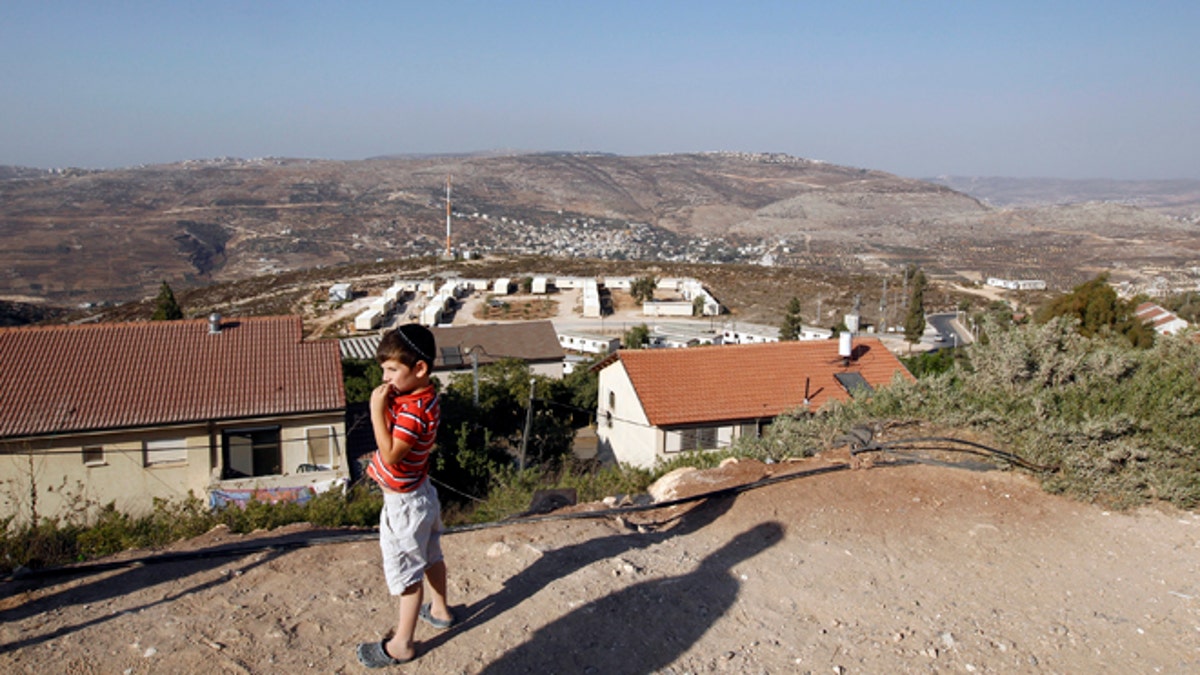
Sept. 20, 2010: A boy stands in the West Bank Jewish settlement of Yitzhar, south of Nablus. (Reuters)
HAIFA, Israel – Israelis are concerned by growing tension caused by the collapsing peace talks and by renewed calls from some in the international community to boycott their country. But many people appear significantly more troubled by last week’s shocking attack by a community of right-wing Jewish settlers in the West Bank on an army outpost that was there to protect them.
“The nationalist crimes will develop into terrorism, and that would be a significant threat to the State of Israel,” Benny Gantz, chief of staff of the Israel Defense Force, said in an interview Monday on Israel Radio. “I am hurt on behalf of the fighters in the field, who risk their lives for security, if this is the answer they receive.”
Gantz was speaking about last week’s violent incident in the West Bank settlement of Yitzhar that resulted in the burning to the ground of the army outpost manned by six reservist soldiers. Overrun by the mob, the soldiers refrained from defending army property and firing on the attackers, an action that might potentially have caused loss of life to their fellow Jews.
The attack came as settlers vented their anger at the fact that soldiers and police had overseen the demolition of five houses the previous day -- houses built illegally by the religious settlers -- that were the subject of an Israeli court order to be removed.
[pullquote]
In response, the army commandeered a yeshiva (religious studies) building at the center of the settlement, making it their new base in Yitzhar. Many of the rioters are alleged to have come from the yeshiva.
Five suspects, including two teenagers, have been arrested for leading the 50 or more rioters. The feeling of many in Israel is that anything other than a significant custodial sentence for the attack referred to in much of the media as a modern-day “pogrom” would be a travesty, and that had such an attack been perpetrated by Israeli Arabs or Palestinians they would have certainly felt the full force of the law.
Seemingly emboldened by a lack of prosecutions against them in the Israeli courts for “price tag” attacks -- acts carried out by settlers and others in response to government actions they perceive to impinge on building on disputed land Christian sites -- extremist settlers have become a serious headache for the government.
The attacks include criminal incidents such as offensive graffiti, violent physical attacks, slashing car tires and the destruction of property targeting neighboring Palestinians
The government’s dilemma appears to be that clamping down hard on the perpetrators might potentially break the ruling Netanyahu-led coalition that includes the Israel Home party, led by Energy Minister Naftali Bennett, openly sympathetic to the settlers and who has been vocal in his opposition to peace negotiations.
Attacking their own soldiers, however, is seen by Israelis as beyond the pale and makes the incident highly personal. Most Israeli families have, or have had, sons and daughters conscripted into the army to defend their country. The thought of soldiers being attacked by Jewish settlers while carrying out their duties has prompted a severe backlash from the mainstream.
President Shimon Peres, seemingly mindful of the potential internal unrest the incident make provoke, urged, “The damage this [the burning of the army post] causes to the security of Israel is indescribable and I urge everyone to preserve unity and show responsibility.”
“The situation in Yitzhar can escalate to shooting soldiers” Maj. Gen. (res.) Avi Mizrahi, former chief of Israel’s Central Command, told local news website YNet in the wake of the incident. “I've experienced a few times that when I brought Jewish rioters to court they were released. . . Other than talking, the politicians are not doing anything.”
The public outcry that has followed the Yitzhar incident comes hot on the heels of the latest “price tag” attacks on the Christian Arab village of Jish earlier this month, in which 40 cars had their tires slashed and offensive slogans were spray-painted on walls. Another attack targeted the Catholic monastery of Dir Rafat, near Beit Shemesh, inside the Green Line (the internationally recognized 1967 Israel border), where slogans such as “America is Nazi Germany” were written on the monastery walls.
As recently as January this year, against the background of a steep rise in the number of “price tag” attacks and the dismissal by a government committee of a proposal to treat such attacks as terrorism, Knesset member Eitan Cabel (Labor) stated, “There is an absurd situation wherein a bunch of criminals place themselves above the law, while the hands of the state and the security forces are tied in terms of appropriate and deterrent punishment. We cannot accept these actions, not when they are perpetrated against Jews, and not when they are perpetrated against Arabs.”
The proposal to label price tag attacks as terrorist had been supported by, among others, the head of the Shin Bet (Israel’s internal security service), the Justice Minister Tzipi Livni and the Public Security Minister Yitzhak Aharonovitch, but was opposed by Prime Minister Benjamin Netanyahu. Israelis are now waiting to see if the Yitzhar army post attack will prompt those government ministers previously opposed to tackling the violent settlers to review their position and handle the matter before things deteriorate further.
Paul Alster is an Israel-based journalist who can be followed on Twitter @paul_alster and at www.paulalster.com.
